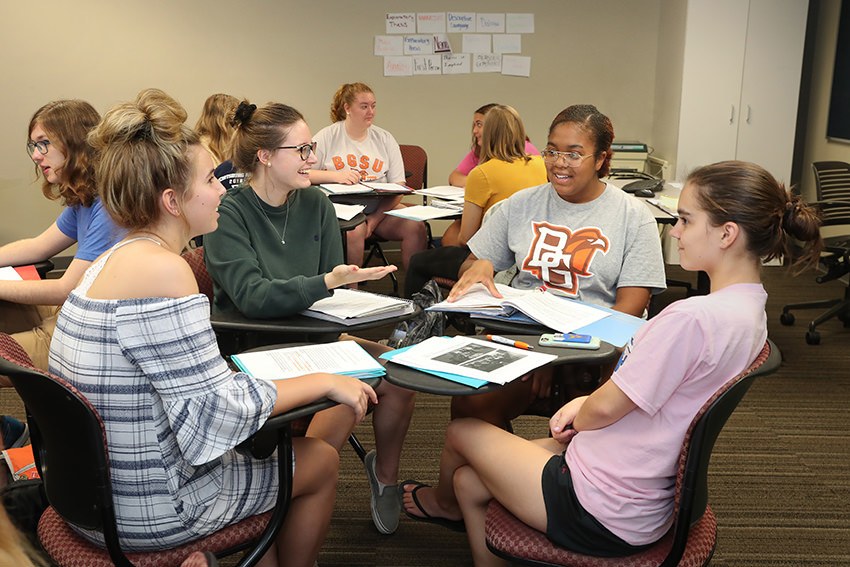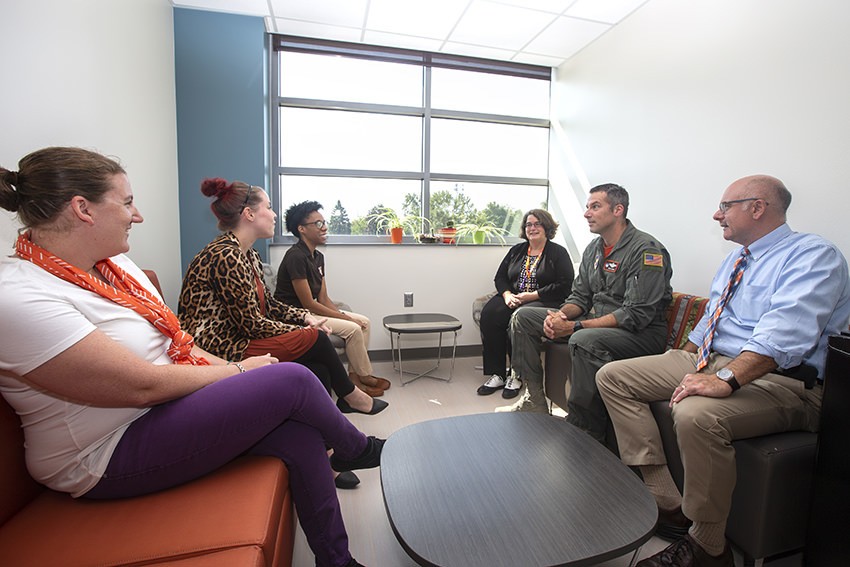BGSU learning communities thriving

By Bonnie Blankinship
Undergraduate students at Bowling Green State University have the opportunity to take the “Belong” in “Belong. Stand out. Go far” even further by choosing to be part of a learning community. No matter whether their interests lie in social justice or business, health or history, “There’s something for everyone,” said Dr. Brett Holden, coordinator of the University’s learning communities and director of the Chapman Learning Community one of BGSU’s oldest.
About 1,400 students are members this year of a learning community, which can be residential or nonresidential, themed by interest or by major. Whatever their focus, all provide students a smoother transition to college and a supportive group with whom to share this most crucial time in their lives. Faculty affiliated with learning communities tend to be student-centered and understand that academic and life experience must work together for students to be successful, or, as Holden said, “it shouldn’t be the learner vs. the ‘liver’ — they should meet in the middle. That’s what’s powerful.”
Perhaps not surprisingly, students in learning communities have an exceptionally high retention rate, he said.
Some learning communities have been in operation for more than 20 years, such as the Natural and Health Sciences Community (NHSC), for students majoring in health, science and pre-professional programs. Located in Offenhauer, it offers additional resources such as tutoring and specialized software programs to give students an edge in applying to competitive programs, along with community meals and social events to balance academic life.
Another of BGSU’s longest-running residential communities is for students in the Honors College.
“Honors Housing has a long, rich tradition dating back to 1968 when our students informally lived together in Conklin Hall,” said Dr. Jodi Devine, associate dean of the Honors College and director of the Honors Learning Community. “Now located in Founders Hall, the Honors Learning Community offers a variety of travel and programming options for its 445 members. Students recently traveled to Stratford, Ontario, in Canada to see two Shakespeare performances and will travel to Washington, D.C., and Chicago later this year to experience the theatre and museums offered there. Upper-class members of the community are also using support from the community to travel to places like New Zealand, Puerto Rico, and Costa Rica.” Gathering for a discussion are learning community leaders (from left to right) Meredith Dixon, Health, Wellness and You; Claire Hoover, Education and Human Development; Sarah Jurden, Academic Investment in Math and Science; Susana Peña, Finding Your Voice in Social Justice; David Garon, Air Force ROTC; and Brett Holden, academic affairs coordinator of learning communities and director of Chapman Learning Community.
Gathering for a discussion are learning community leaders (from left to right) Meredith Dixon, Health, Wellness and You; Claire Hoover, Education and Human Development; Sarah Jurden, Academic Investment in Math and Science; Susana Peña, Finding Your Voice in Social Justice; David Garon, Air Force ROTC; and Brett Holden, academic affairs coordinator of learning communities and director of Chapman Learning Community.
Like Honors, Chapman is open to students of any major. Members tend to be those who want to make an impact in the world. The award-winning community blends service-learning with intentional programming including formal assessment, reflection and leadership skills development. Members commit to participate in weekly animal welfare, local ecology, soup kitchen or veteran-assistance activities according to their interests, as well as to a host of other community-partnership opportunities.
Chapman has been nationally recognized for the first-year experience it provides students, and, as a founding faculty member, Holden said it also serves as a good model for “beta testing” new ideas and activities. It was among the first to offer a more holistic learning experience to counter the traditional, “cafeteria” model of courses, in which there is no connection made between what students learn in their various classes. Its group discussions, experiential-learning focus and reflective exercises provide a context to link learning across disciplines.
Context is an important aspect of the ECCO (Educators in Context and Community) learning community in the College of Education and Human Development. The community is designed to prepare education majors and others who want to work with children and families for the realities of their profession through extensive field placements and community engagement.
Among BGSU’s newer communities are two nonresidential, pilot options: History Village and Finding Your Voice in Social Justice, both open to any major but aimed at bringing together students who share common interests. Both help students learn to apply the knowledge and skills they gain through relevant activities and classes to turn their values into action in their communities.
Finding Your Voice in Social Justice asks incoming students to complete an essay application about why they’re interested in the community, and applicants tend to be those who were involved in organizing around issues such as gun control or violence in marginalized communities in high school, said Dr. Susana Peña, director of the School of Cultural and Critical Studies, who helped develop the learning community, with Dr. Jessica Birch, the learning community’s faculty director, and other faculty in the school.
“Our students are very diverse in terms of race, gender identity and sexuality,” Peña said. “We wanted to create an inclusive community where students could feel connected and be successful at BGSU.”
Participation in a learning community tends to nurture leadership skills, Holden said, and students often go on to campus work that utilizes those skills.
“Learning community members often form their own communities and become more involved in organizations,” he said. “We’ve had students become admissions tour guides, residence hall staff and hall council members, Freddie and Frieda, Undergraduate Student Government president and vice president — they use their leadership skills to contribute to campus life.”
In many of the communities themselves, second-year students take on roles mentoring incoming students. Sean Blakeslee, a second-year social work major from Columbus, Ohio, is now part of a Chapman student leader team overseeing the first-year students. He in turn was mentored by other community members and graduate assistants, and credits the community with improving his study skills and enabling him to feel confident as a first-year student.
“It’s hard to describe until you’ve lived it,” he said, “but this is a family, even with all our diverse majors and mindsets. It’s the perfect first-year experience.”
Some of the communities, including Finding Your Voice and Construction Management, are free, but others charge a fee to participate, depending on the activities involved. All fees go back into the community, Holden said. Among these are the Business District, housed in Kohl Hall, which provides its members mentorship and career networking with business professionals, participation in conferences and educational visits, and close interaction with faculty.
In all the communities, students benefit from becoming comfortable with faculty, which enhances their learning throughout their education careers.
The Batchelder Music Community is located close to Moore Musical Arts Center and has practice rooms for students, who also study and attend concerts together and understand the specific demands of a commitment to music.
Likewise, the Aviation Community also offers an atmosphere that is conducive to students' early morning flight times and the demanding nature of aviation course work. It is open to aviation majors and those in Air Force ROTC.
Health, Wellness and You members become involved in research on their own health patterns as well as participate in cutting-edge research with health and wellness experts. They contribute to designing programs that promote a healthier campus for all students.
La Communidad, La Maison Française and the Global Village offer cross-cultural immersion along with the opportunity to polish language skills. Global Village also attracts many of BGSU’s students from other countries.
The relationships formed among learning community members and with faculty are strong and tend to endure past graduation, Holden said.
“Many have reunions, attend each other’s weddings, have godchildren, see each other at Homecoming,” Holden said. “We find so many ways to connect back.”
Updated: 06/25/2025 10:46AM
